Unique of its kind, the Scholarship for the Next Generation of Scientists (SNGS) offers bridge financing between postdoctoral work and an independent research position ($170,000 over three years). This opportunity is extremely valuable as it represents a launch pad for the most talented researchers to gradually and effectively establishing their independence in a recognized Canadian university. This year, CRS awarded four SNGS and was recognized in the 15-year report of the Canadian Cancer Research Alliance (CCRA), an alliance of organizations that collaborate to promote partnerships among cancer research funders and the development of research priorities in Canada:
‘There has been much written in the past few years about the precarious position of postdocs, often considered to be the most valuable members of research laboratories, and this has been exacerbated by the pandemic. CRS’s two-pronged “Scholarships for the Next Generation of Scientists” is an innovative mechanism to address this issue.’ — from the CCRA 15-year report
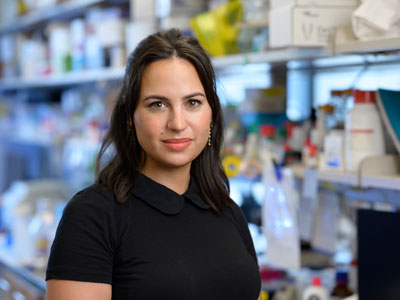
Miranda Hunter , Memorial Sloan Kettering Cancer Center (MSK), NY, USA– research associate
SNGS as an opportunity to bring Dr. Hunter home to Canada for her to continue her studies on how melanoma spreads and metastasizes
Dr. Hunter comes from a family of scientists, and she was personally affected by cancer when her mother sadly died of colorectal cancer in 2008 at age 47: ‘This experience led me to my current role in cancer research and continues to motivate me daily to work towards improved treatments and an eventual cure.”
Today Miranda is one of the five grantees of the CRS SNGS 2022 competition, allowing her to continue her work in cancer research. After pursuing her postdoc in the laboratory of Prof. Richard White at Memorial Sloan Kettering Cancer Center in New York (USA), Dr. Hunter is looking forward to coming back to Canada to establish her independent research lab.
“I am so grateful for the SNGS program and wish more programs like it existed in Canada. Many of my peers and I left Canada searching for opportunities in the US or Europe. Programs like SNGS provide an incentive to return to Canada, allowing us to retain top talent who would otherwise go elsewhere.”
Dr. Hunter’s program will focus on the study of melanoma, the deadliest of skin cancers, and how tumor cells interact with neighboring tissues that they eventually invade. Her research is at the interface of cell biology, bioinformatics, and imaging.
“Melanoma is dangerous because if it is not detected early, it often spreads or metastasizes to other parts of the body. Understanding how melanoma grows and spreads to different organs will allow us to develop new treatments to improve the long-term survival of melanoma patients.”
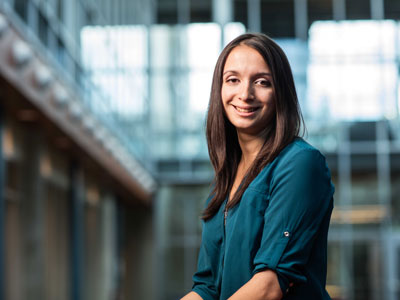
Krysta Coyle, Simon Fraser University, Department of Molecular Biology & Biochemistry, BC
– postdoctoral fellow
Understanding specific biological events at the RNA level might be vital to finding better treatments for lymphomas
“Lymphomas are a type of cancer which affect cells of the immune system, and only 65% of patients diagnosed with these cancers expect to live more than five years”
Dr. Krysta Coyle, a researcher at Simon Fraser University carrying out her postdoctoral work in the laboratory of Dr. Ryan Morin. Her research combines traditional bench-based experiments with computational biology with a focus on the study of lymphomas. Dr. Coyle wants to understand better the processing of RNA by the cell and how malfunctions of these processes might be linked to cancer. The SNGS will allow her to establish her own laboratory that will focus on carrying out research to understand better the role of a group of genes known as splicing factors involved in RNA processing.
“Our work has identified a large number of mutations affecting [the] splicing factors [and their possible correlation to cancer]; after developing an understanding of how splicing affects normal cells, we will be positioned to manipulate this process in lymphoma cells and determine how these mutations affect patient outcomes.”
With her studies, Dr. Coyle hopes to identify new ways to treat lymphomas and improve patient survival. “I would absolutely encourage other early career researchers to apply – it eliminates the uncertainty about where that first independent grant will come from!”
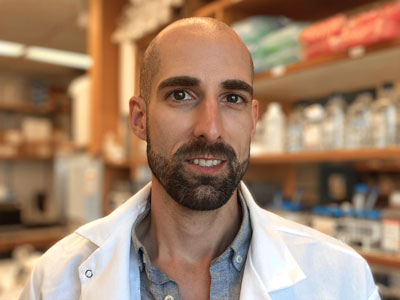
Mathieu Quesnel-Vallières , Department of Genetics and Department of Biochemistry & Biophysics, University of Pennsylvania – (Philadelphia PA, USA) – postdoctoral researcher
Bringing computational approaches and bench-work together makes for an effective way to fight acute myeloid leukemia.
Dr. Mathieu Quesnel-Vallieres is a postdoctoral researcher at the University of Pennsylvania working in the laboratories of Prof. Yoseph Barash and Prof. Kristen Lynch. Of his research, he says: ‘I use computational approaches to find molecular patterns that exist in cancer cells, but not in normal tissues. These molecular patterns can be targeted to specifically kill cancer cells using immunotherapy, one of the most recent and advanced types of cancer treatment. My current research focuses on an aggressive form of blood cancer – acute myeloid leukemia – but my work will eventually apply to a large array of tumor types.”
Being trained as a lab person and a computational scientist, Mathieu is in a unique position where he can leverage computational analyses to discover treatment targets that he then validates in the lab. His work on Acute myeloid leukemia (AML) is essential as AML is an aggressive blood cancer with a low survival rate. The current therapies often fail, and few alternative treatments are available.
Being granted a CRS SNGS this year will allow Dr. Quesnel-Vallières to continue his work and establish his independent research career.
“I can say that the SNGS has already made a difference for me in the way that it opens doors and creates connections. This award is a unique opportunity that early career researchers should seek as a cornerstone upon which to launch their independent research program.”
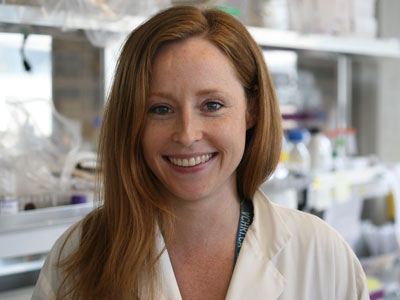
Morgan Roberts, Vancouver Prostate Centre, University of British Columbia, Department of Urologic Sciences, BC – Research Associate
SNGS as a launch pad to independence for early career researchers
Dr. Morgan Roberts is a postdoctoral researcher at the University of British Columbia in the laboratory of Prof. Peter Black. Her research revolves around bladder cancer and immunotherapy.
“Immunotherapies, which aim to activate anti-cancer immune responses, have been successful against a number of cancer types, including bladder cancer. However, these therapies do not work in many patients because cancer cells have many ways to avoid clearance by the immune system.”
Dr. Roberts hopes to improve the understanding of how bladder cancer escapes the immune system and use this information to design improved treatments. But the results of her study are not limited to bladder cancer, as they will also form the basis for studying similar processes in other types of cancers.
In Morgan’s words, the postdoctoral project that she will now be able to carry out, thanks to her recently awarded CRS SNGS 2022, is fundamental to progress to an independent research career
“Through this work, I am continuing to develop my expertise in immune-oncology and aim to further cement my role as a leader in this field at the Vancouver Prostate Centre. [Furthermore] Holding an SNGS award provides evidence to prospective employers of the ability of the researcher to successfully obtain research funds, which is a critical advantage in such a competitive job market.”
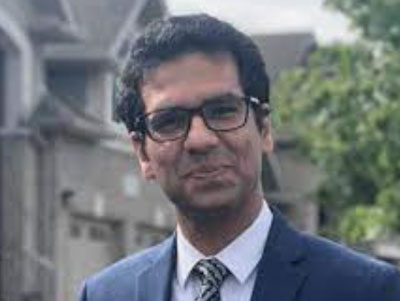
Taha Azad, Ottawa Hospital Research Institute, ON – postdoctoral fellow
Understanding the immune system ‘checkpoints’ to help our body fend off cancer
Dr. Azad is delighted to be able to continue his research career in Canada also thanks to a recently awarded CRS SNGS
“Since moving to Canada in 2014, I’ve been learning about the fantastic culture of collaboration among Canadian scientists, and I’m thrilled to be a part of the country’s next generation of scientists.”
Dr. Azad secured an Assistant Professor position, as an independent researcher, at the University of Sherbrooke, starting in June 2023. During the next few months, he will complete his transition as a postdoctoral researcher at the Ottawa Hospital Research Institute (ON).
His work will focus on the study of the so-called ‘immune checkpoints.’ These checkpoints are part of our immune system, and they fine-tune our immune response, which otherwise could become too strong and destroy healthy cells in our body. Cancer cells can disrupt the function of the checkpoints allowing tumor growth.
“Immune checkpoint blockade therapy has established itself as a prominent weapon in the fight against cancer. [However], little is known about the biology and essential regulators of these immunological checkpoints and how they interact with their ligand. This project aims to create novel biosensors for the major immune checkpoints [to understand their underlying mechanism better]. These findings may pave the way for developing safer and targeted immunological checkpoint inhibitors for clinical translation.”
